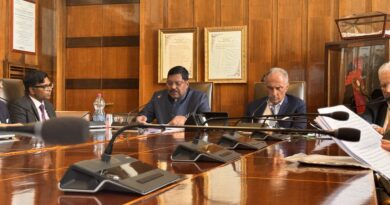Demonetisation: SC Upholds Centre’s Decision With 4:1 Majority
(Judicial Quest News Network)
A constitutiton bench of Supreme Court today dismissed all the pleas challenging the demonetisation of currency notes of Rs.500/- and Rs 1000/- by the Central government in Novemeber 2016.
On November 8, 2016, Prime Minister Narendra Modi through a televised address declared that denomination notes of Rs.500 and Rs.1000 would no longer be legal tender.
A constitution bench of Justice S.Abdul nazeer, BR Gavai, AS Bopana, V. Ramasubramanian and BV Nagara delivered the verdict on a batch of petitions.
Justice BR Gavai has authored the judgemnent in which he observerd that from the records it appeared that there was consultation between RBI and Central Government, and thus there was reseanoable nexus between the purpose to be achieved by the said decision and the limitations on the constitutional rights.
Justice BR Gavai reffrerred to the powers of the RBI available under Section 26 (2) of the RBI Act, such powere cannot only be utilized for only a particular series of bank notes.
“The notification issued by the government thus satisfiesd the test of proportionality and the time period provided for exchange of currency cannot be said to be unreasonable”
The Apex court also declared that the 52-day window for exchange of notes cannot be said to be unreasonable and can’t be extended now.
The bench said that there has to be great restraint in matters of economic policy and the court cannot substitute, supplant, or supplement the wisdom of the executive with its own views.
Hoever Justice Nagarat differed from the majority view, and delivered a dissenting judgement .She said the proposal for demonetisation must be undertaken by a legislative measure not through gazette notification.
She aslo faulted the proposal for having been advanced by the Central government in the caase.She also said demonetisation cannot be undertaken on all series of currency notes.
Justice Gavai said that as already discussed herein above, the record itself reveals that the RBI and the Central Government were in consultation with each other for a period of six months before the impugned notification was issued.
The record would also reveal that all the relevant information was shared by both the Central Board as well as the Central Government with each other. As such, it cannot be said that there was no conscious, effective, meaningful and purposeful consultation.
In the present case, the majority held that if the demonetisation notification had a nexus with the objectives to be achieved, then, merely because some citizens have suffered through hardships, would not be a ground to hold the notification to be bad in law.
Justice nagarathna noted that 98% of the value of the demonetized currency exchanged for bank notes continue to be legal tender,suggesting that the exercise was not effective as it was intended to be.




